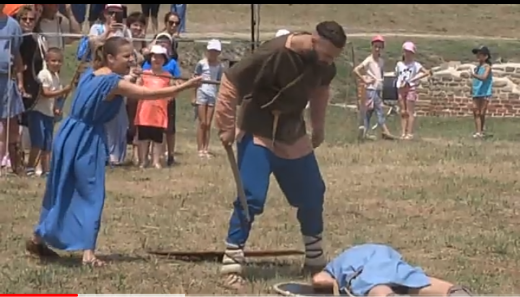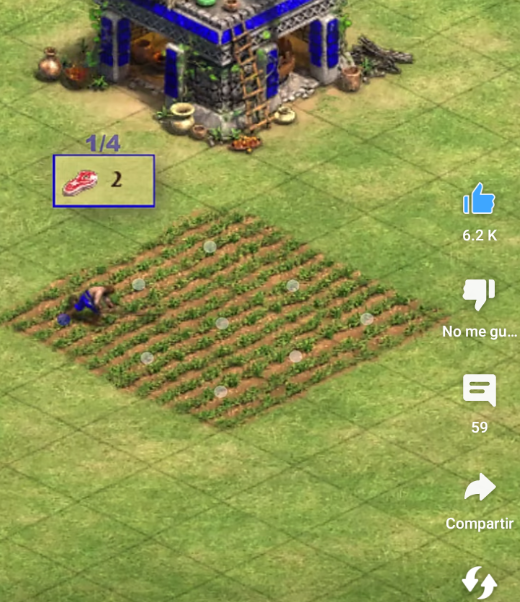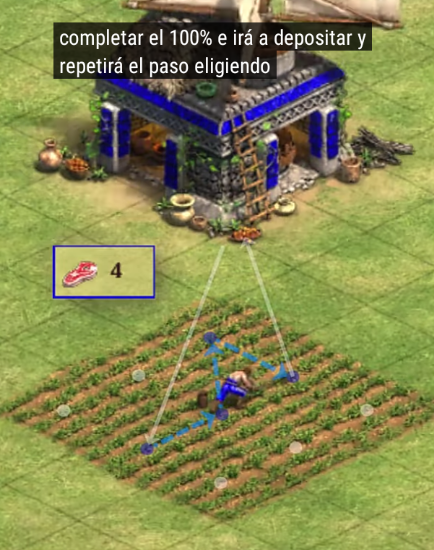-
Posts
25.684 -
Joined
-
Days Won
302
Everything posted by Lion.Kanzen
-
Yes I agree with this suggestion, it is absurd to have:to be required in order to upgrade resource gathering that you do not have, simple game-wise .
-
.thumb.png.ce58cea22940c255f5b0a735d5abee36.png)
Improved Farming Animation / Mauryan Palace
Lion.Kanzen replied to Gurken Khan's topic in Gameplay Discussion
@Stan`We need to split a section on this topic. With the topic of farms. But the problem is not a simple animation matter. -
.thumb.png.ce58cea22940c255f5b0a735d5abee36.png)
===[TASK]=== Crowd Sourced - Thracians (Faction)
Lion.Kanzen replied to Cleo's topic in Game Modification
-
.thumb.png.ce58cea22940c255f5b0a735d5abee36.png)
Civ: Germans (Cimbri, Suebians, Goths)
Lion.Kanzen replied to wowgetoffyourcellphone's topic in Delenda Est
-
.thumb.png.ce58cea22940c255f5b0a735d5abee36.png)
Civ: Germans (Cimbri, Suebians, Goths)
Lion.Kanzen replied to wowgetoffyourcellphone's topic in Delenda Est
In case Germanic combat animations are needed. -
.thumb.png.ce58cea22940c255f5b0a735d5abee36.png)
Romans military image references
Lion.Kanzen replied to Lion.Kanzen's topic in Tutorials, references and art help
I didn't know that the stones had messages. -
.thumb.png.ce58cea22940c255f5b0a735d5abee36.png)
Age of Empires 2 Definitive Edition
Lion.Kanzen replied to Lion.Kanzen's topic in Introductions & Off-Topic Discussion
Scholae Palatinae It would have been better. Decisions made on the basis of the "Cool" rule: above knowledge. These decisions are made more by a marketing specialist than a historian. -
.thumb.png.ce58cea22940c255f5b0a735d5abee36.png)
Improved Farming Animation / Mauryan Palace
Lion.Kanzen replied to Gurken Khan's topic in Gameplay Discussion
There is a process and a way of proceeding that is called methodology. We have our methods to preserve order. First you find the problem, then you discuss how to solve it (this is very important for transparency issues). The discussion part is important before making a decision, and the decision does not go through you. -
.thumb.png.ce58cea22940c255f5b0a735d5abee36.png)
Improved Farming Animation / Mauryan Palace
Lion.Kanzen replied to Gurken Khan's topic in Gameplay Discussion
You don't make the decisions. -
.thumb.png.ce58cea22940c255f5b0a735d5abee36.png)
Age of Empires 2 Definitive Edition
Lion.Kanzen replied to Lion.Kanzen's topic in Introductions & Off-Topic Discussion
-
.thumb.png.ce58cea22940c255f5b0a735d5abee36.png)
Improved Farming Animation / Mauryan Palace
Lion.Kanzen replied to Gurken Khan's topic in Gameplay Discussion
Ideally, it should function as a group of resources like a grove of trees. Theoretically, this should be the case, as a group of resources in the same entity. -
.thumb.png.ce58cea22940c255f5b0a735d5abee36.png)
Improved Farming Animation / Mauryan Palace
Lion.Kanzen replied to Gurken Khan's topic in Gameplay Discussion
Mauryan gardens Mauryan civilisation, under the rule of Ashoka (269-232 BC), converted to Buddhism and built religious structures in stone. Stupas representing Buddha's tomb, were placed in fenced enclosures. The Mauryan's also built palaces and there is a Greek description (by Megasthenes) of a palace set amongst gardens at Patna. It had open halls and wooden columns The Hindu scriptures (shastras) set down a code for the orientation and organisation of buildings in relation to compass points, hills, water and plants. This art (vastu - Sanskrit for nature ) travelled to China, along with Buddhism, and developed into the Chinese art of feng shui. Enclosed outdoor space, in the form of courtyards, became intrinsic to India housing. Town dwellings (haveli), also in mud, had rooms grouped round a courtyard. No old palace buildings survive but rock carvings (eg at Sanchi and Ajanta) show them to have been airy structures with timber columns. They compares with the construction of Persepolis and there was cultural contact between the Mauryan and Achaemenid (Persian) civilisations. The illustrations at Ajanta (see Michell, G The royal palaces of India p.69) show plants in front of and behind the platform and columns. Michell comments that 'outside the palaces are gardens with fruit trees inhabited by birds as well as ponds with ducks and fish'. [See note on Buddhist gardens. https://www.gardenvisit.com/history_theory/garden_landscape_design_articles/west_asia/indian_garden_hindu_buddhist -
.thumb.png.ce58cea22940c255f5b0a735d5abee36.png)
Software General Topic.
Lion.Kanzen replied to Lion.Kanzen's topic in Introductions & Off-Topic Discussion
https://dailyhive.com/canada/half-web-traffic-bots "Bot-infested wasteland: Almost half of all 2022 web traffic came from bots" -
''Concerning Trend'': Almost Half Of All 2022 Web Traffic Came From Bots, Says Study". https://www.ndtv.com/world-news/concerning-trend-almost-half-of-all-2022-internet-traffic-came-from-bots-says-study-4038382/amp/1 https://dailyhive.com/canada/half-web-traffic-bots
-
This has a cultural background that I love to repeat from time to time: In 1538, Jean Calvin and some of his friends were expelled from the city of Geneva by the authorities. Cardinal Sadoleto took advantage of this moment to send a letter to the public authorities of the city urging them to reject the Reformation and return to obedience to Rome. Cardinal Sadoleto's letter was very well written, but the truth is that it must not have convinced the Genevans, who in 1539 asked Calvin (who was still in exile) to reply to the cardinal by letter. Calvin wrote his reply to Cardinal Sadoleto in six days and the text became a classic in the history of theology. It is beyond the scope of this series to delve into the booklet, but it is worth mentioning because in it we can contemplate two visions of the law that differentiated - as so many other things! - the nations in which the Reformation triumphed from those in which it did not. The dilemma that arose was whether the criterion that marked conduct should be in submission to the law or, on the contrary, to the institution that established without superior control what a law says and to which one must submit. Sadoleto defended the second criterion while Calvin supported the first.For Calvin, it was obvious that the law - in this case, the Bible - had primacy and, therefore, if a person or institution departed from it, it lacked legitimacy. Cardinal Sadoleto, on the other hand, argued that it was the institution that decided how that law was applied and that to depart from obedience to the institution was extraordinarily grave. The Reformation opted for the first view, while in the nations where the Counter-Reformation took hold a different principle was maintained, which established not only that not everyone was equal before the law but that, in addition, there were social sectors that were not subject to the law. A culture of justified exception was thus created. Translated From- Protestant Reformation and the primacy of the law https://protestantedigital.com/la-voz/1863/reforma-protestante-y-la-primacia-de-la-ley ---- This has a cultural background that I love to repeat from time to time. And you are right the rules do and should apply equally to everyone with no exceptions. https://www.americanbar.org/groups/public_education/resources/rule-of-law/ The rule of law is a set of principles, or ideals, for ensuring an orderly and just society. Many countries throughout the world strive to uphold the rule of law where no one is above the law, everyone is treated equally under the law, everyone is held accountable to the same laws, there are clear and fair processes for enforcing laws, there is an independent judiciary, and human rights are guaranteed for all.
-
.thumb.png.ce58cea22940c255f5b0a735d5abee36.png)
Improved Farming Animation / Mauryan Palace
Lion.Kanzen replied to Gurken Khan's topic in Gameplay Discussion
We also have to change the construction animation. It would not be construction itself, it would be seeding. -
.thumb.png.ce58cea22940c255f5b0a735d5abee36.png)
Improved Farming Animation / Mauryan Palace
Lion.Kanzen replied to Gurken Khan's topic in Gameplay Discussion
But they would not be completely synchronized. The only thing I would like is for them to move, it occurs to me that they could work as if they were multiple fruit bushes, i.e. a farm should be like multiple food resources in one. Only it should regenerate again after harvest. In Delenda Est there are already groups of trees that are a single entity. And they are worked individually. The difference is that the farm is not exhausted. It is complicated to keep it infinite and to make it work well. I don't know if it can be tested that way. In mythology they are also infinite, the difference is that our farms are for multiple units. -
That's almost done. We are working on it. In a couple of years we may be able to create a game balance updater. Hahaha I notice that too
-
.thumb.png.ce58cea22940c255f5b0a735d5abee36.png)
Improved Farming Animation / Mauryan Palace
Lion.Kanzen replied to Gurken Khan's topic in Gameplay Discussion
How could it work in 0 AD. I mean how many points will be? and how many citizens could work at a time per point/segments? -
.thumb.png.ce58cea22940c255f5b0a735d5abee36.png)
Improved Farming Animation / Mauryan Palace
Lion.Kanzen replied to Gurken Khan's topic in Gameplay Discussion
I have a video of that movement. The farm is divided into 9 points in aoe II. The villager collects first 1/4 of what he can carry at the first point and so on 2/4...3/4..4/4 These points are randomly defined -
You in Europe take for granted that the supremacy of law and equality is given in all countries. That thought predominates more in Protestant Europe, in other cultures we are more relaxed with that norm (that's bad). But it is the reality, in hospic cultures it is normal, then this generates corruption and preferential treatment.







